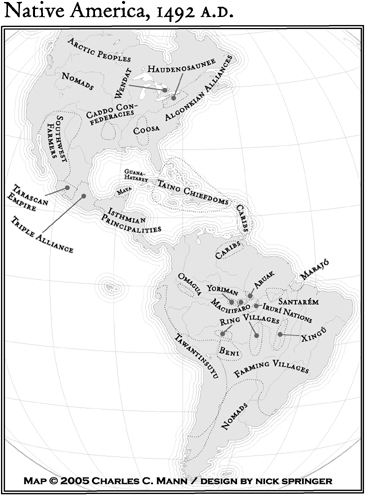One very good book on this topic is 1491 by Charles Mann. The book gives an overview on what life in the Americas was like directly before and during the arrival of the first Europeans. It's written for laypeople, but it does give evidence and sources, if you want to do further research.
The book is more focused on South America and Central America, because the people who lived there had a more "complex" civilisation when Europeans met them, and more of the indigenous people are still around, so sources are much better. But it also describes the situation in North America.
This what I remember from the North-America focused parts of the book:
I've stated above that North American civilisations were less complex than South American ones (hunter-gatherers and small agricultural communities instead of city-states and empires). A good explanation for this is that the North American climate and geography does not support a more complex civilisation without modern technology. However, it's important to note that European diseases arrived inaffected many parts of North America before theany actual Europeans didarrived there, so it's possible that a large part of the native civilisation was wiped out before the colonialists ever got to see it.
Overall, I'd say the evidence points to Native Americans having good lives compared to their contemporaries in the old world. European settlers often stated that Native Americans were remarkably tall and attractive, which means they must have had good food and relatively little disease. In situations where a Native American ended up living with European settlers, they were generally eager to return home. On the other hand, there are many accounts of settlers who were captured by Native Americans and chose to stay with them rather than return to the other settlers.
It's notable that a lot of modern American culture is adapted from what Native Americans did before European arrival. For example, many American foods were originally Native American. There is also speculation that the American political organisation owes as much to the Iroquois League and other Native polities as to European political thought.
Of course, pre-colonial American life was much like any other pre-modern life, less comfortable than modern life. I'll assume that the general question of the advantages and downsides of pre-modern life is not relevant here, and compare the Americans to their contemporaries.
After colonisation, life became much worse for the natives. First came the diseases, which killed a large percentage of the population, quite possibly the majority. After that, Europeans often displaced or enslaved the survivors. In the 19th century, many Native Americans were killed in wars, forced to migrate to a far-away part of the country, or had their children taken away to be educated by white settlers. In that time period, their lives probably did contain a lot of misery.
